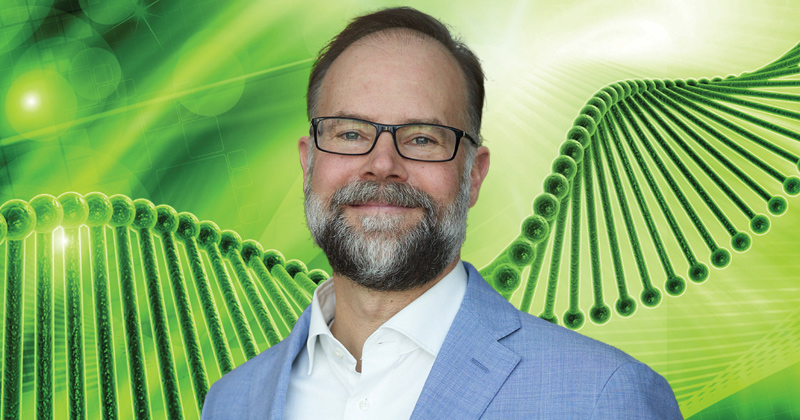


Jefferson Lecture: Plant biologist Blake Meyers
Photo illustration by David Barczak April 24, 2023
Former UD faculty member to highlight the wonders of small RNAs on May 12
Although small RNAs were discovered only within the last few decades, scientists now know these tiny molecules of ribonucleic acids have the remarkable ability to silence genes in many living organisms.
In plants alone, small RNAs have been shown to control development, metabolism, immunity against pathogens, even how plants respond to stressors like extreme temperatures and drought.
As more mysteries of these “small wonders” come to light, the findings are being applied to develop more resilient and productive crops amidst the mounting pressures of climate change and population growth.
“Improving agricultural productivity is a key motivator and justification for many biologists to study plants — and it is potentially the biggest impact of our work,” said Blake Meyers, a leading plant biologist at the Donald Danforth Plant Science Center in St. Louis.
Meyers, a former member of the University of Delaware faculty, developed or co-developed several critical methodologies and applications of gene sequencing technologies — some while at UD — that have catapulted plant biology research forward.
On Friday, May 12, Meyers will present UD’s annual Edward G. Jefferson Lecture, starting at 4 p.m. in Mitchell Hall on the Newark Campus. The lecture is free and open to the public. Please register online. A reception will be held in nearby Gore Hall after the event.
“Dr. Meyers has transformed our understanding of how plants grow and develop, which has wide application to crop improvement,” said Kelvin Lee, interim vice president for research, scholarship and innovation. “We are delighted to welcome this distinguished scholar, and our friend, back to the UD campus for this year’s Jefferson Lecture.”
After completing his freshman year in college, Meyers said he considered pursuing economics or one of the humanities as a career path. But he felt that biology was more satisfying because it gave him an understanding of how the natural world works.
“I was drawn to plants because they are essential organisms for their role in food and many other products, as well as their beauty. And I felt that plants are somewhat underappreciated,” Meyers said.
He got a position in a research lab as a sophomore — a job he kept for the rest of his undergraduate education, which led to his first scientific publication. In the years since, his career has thrived. Today, with several collaborators, his laboratory is focusing on small RNAs in plant fertility as a possible avenue for boosting yield in wheat and other important cereals.
Meyers was elected to the U.S. National Academy of Sciences in 2022.
The Edward G. Jefferson Lecture
Endowed by a gift from the Unidel Foundation, the Edward G. Jefferson Lecture is named in honor of the late chairman and chief executive officer of the DuPont Co., UD trustee emeritus and UD benefactor. The lecture highlights distinguished work in the life sciences.
Contact Us
Have a UDaily story idea?
Contact us at ocm@udel.edu
Members of the press
Contact us at 302-831-NEWS or visit the Media Relations website

